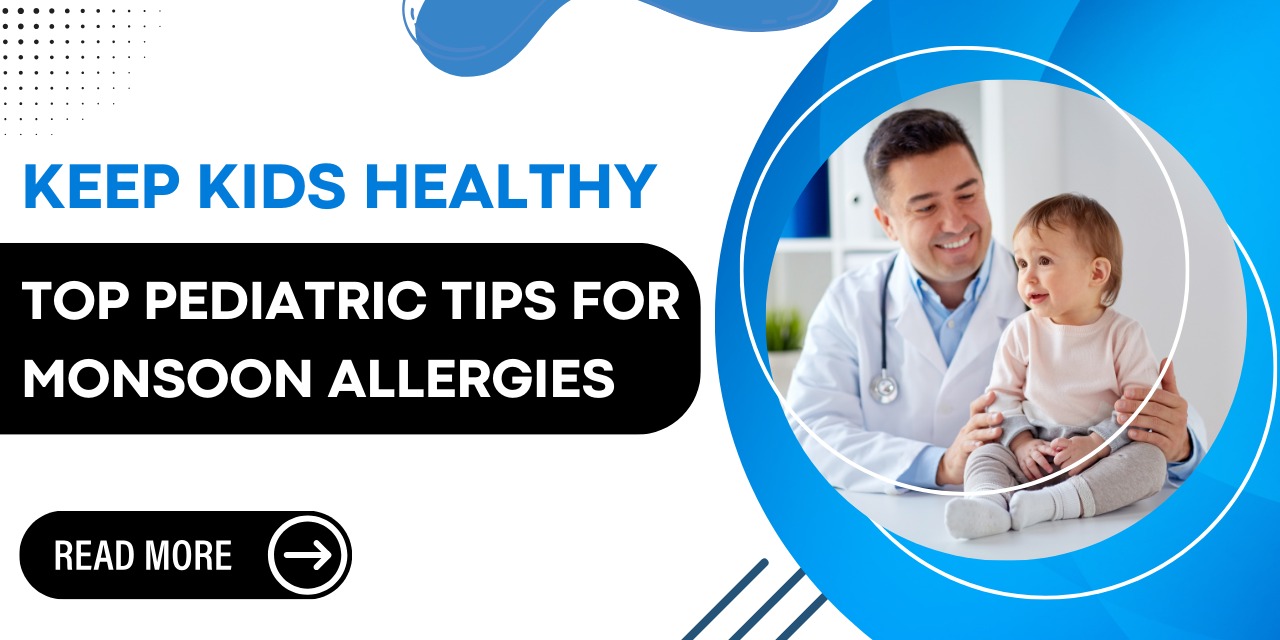The monsoon season brings relief from the summer heat but also a surge in allergies and infections, especially among children. The increased humidity and dampness create an ideal environment for allergens like mold, dust mites, and pollen. As a parent, it is essential to take preventive measures and ensure your child’s health and well-being during this time. Here are some practical tips to manage monsoon-related allergies in children.
Causes of Monsoon-Related Allergies
Monsoon-related allergies in children can be triggered by several factors:
👉 Increased Humidity
The high humidity levels during the monsoon season create a perfect breeding ground for mold and dust mites, which are common allergens.
👉 Pollen
Certain plants release more pollen during the rainy season, leading to respiratory issues in sensitive children.
👉 Mold
Damp conditions promote mold growth, which can cause allergic reactions and respiratory problems.
👉Dust Mites
These thrive in humid environments and can trigger asthma and allergic rhinitis.
👉Polluted Water
Stagnant water and poor drainage systems can lead to waterborne diseases and skin infections.
Tips for Managing Monsoon-Related Allergies
- Maintain Cleanliness: Ensure your home is clean and dry. Regularly clean damp areas like bathrooms and kitchens to prevent mold growth. Use a dehumidifier if necessary.
- Use Protective Gear: Make sure your child wears appropriate rain gear, including waterproof boots and raincoats, to avoid getting wet and attracting allergens.
- Wash Hands and Feet: Encourage your child to wash their hands and feet after playing outside to remove allergens and prevent infections.
- Avoid Pollen Exposure: Keep windows and doors closed during peak pollen hours. Use air purifiers to reduce indoor pollen levels.
- Use Anti-Allergic Medications: Consult a pediatrician for appropriate anti-allergic medications to manage symptoms like sneezing, runny nose, and itchy eyes.
- Regular Cleaning: Wash bedding, curtains, and soft toys in hot water to kill dust mites. Vacuum regularly to remove dust and allergens.
- Healthy Diet: Boost your child’s immunity with a balanced diet rich in fruits, vegetables, and probiotics. Avoid junk food and sugary snacks that can weaken their immune system.
- Hydration: Ensure your child drinks plenty of clean, boiled water to stay hydrated and flush out toxins.
- Personal Hygiene: Teach your child to maintain personal hygiene, including frequent handwashing and not sharing personal items.
Regular Pediatric Check-Ups
Regular pediatric check-ups are crucial during the monsoon season to monitor your child’s health and prevent severe allergic reactions. A pediatrician can provide personalized advice, prescribe necessary medications, and perform allergy tests if needed. Regular visits to a pediatric treatment doctor in Panchkula, like Dr. Bharat Jain at Axon Hospital Panchkula, ensure that any health issues are promptly addressed and managed effectively.
Frequently Asked Questions
➡ How can I tell if my child has a monsoon-related allergy?
Common symptoms include sneezing, runny nose, itchy eyes, skin rashes, and coughing. If these symptoms persist, consult a pediatrician.
➡ What are the best home remedies for managing allergies?
Maintaining cleanliness, using air purifiers, and ensuring a healthy diet can help. However, it’s essential to consult a doctor for proper treatment.
➡ Can monsoon allergies lead to asthma in children?
Yes, prolonged exposure to allergens can trigger asthma in sensitive children. Regular check-ups and preventive measures are crucial.
➡ Are there specific foods that can help boost my child’s immunity?
Yes, foods rich in vitamins C and E, such as citrus fruits, berries, nuts, and green leafy vegetables, can help boost immunity.
➡ How often should my child see a pediatrician during the monsoon?
It’s advisable to schedule a check-up at the beginning of the monsoon season and follow up as recommended by the pediatrician.
Conclusion
Managing monsoon-related allergies in children requires a proactive approach and regular pediatric care. Ensuring cleanliness, using protective gear, and maintaining a healthy diet are key steps in preventing allergic reactions. Regular visits to a best paediatric treatment doctor in Panchkula are essential for keeping your child healthy during the monsoon. At Axon Hospital , Dr. Bharat Jain provides expert pediatric care to help manage and prevent monsoon-related allergies effectively. For more information, visit Axon Hospital For more details please contact us on :+919878800231












